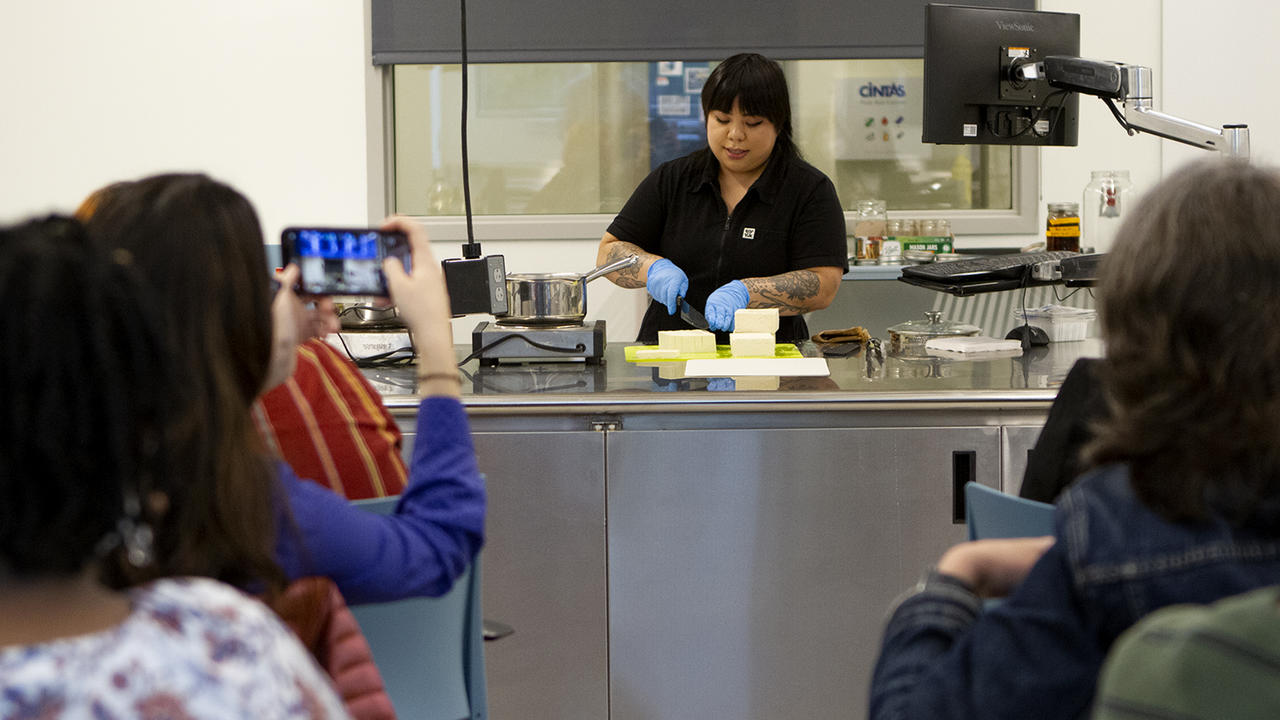
Food Writer Bettina Makalintal ’14 Talks Cooking and Culture
On October 25, the Camilla Chandler Frost ’47 Center for the Environment hosted food and culture writer Bettina Makalintal ’14 for a conversation about her career in food writing and a cooking demonstration in the Science Complex’s Andrea Levitt ’71 Food Sciences Laboratory. Makalintal, who was an associate print editor at Bon Appetit and a staff writer at Vice’s Munchies before her current post as a writer for Eater, cooked Filipino adobo with tofu, and spoke about her time at Wellesley, her relationship to food, and her thoughts about food writing as well as the media world.
“What I was most excited about for this visit was the opportunity to just put food writing on students’ radars,” Makalintal said. “If they’re interested in food and analyzing it and telling stories around it, there are paths toward making that a career or a part of one’s work. I think food writing, and media more broadly, can feel incredibly opaque as an industry. It certainly did when I was outside it.”
Using a hotplate, Makalintal prepared adobo, a dish she learned to love after she began experimenting with tofu and other alternatives to the pork or chicken her parents had added during her childhood. “I never particularly liked it, largely for textural reasons with the meat,” Makalintal said. “As I began to cook Filipino food on my own, I really focused on plant-based cooking. I realized that I actually liked adobo, I just preferred it with vegetables or with tofu.”
The dish also symbolizes, in part, her relationship to her Filipino heritage. “For me, vegetarian adobo represents how I like to think about Filipino food in my life,” Makalintal said. “I can take dishes that remind me of my family and where we came from, but I can adapt them to my own palate, preferences, and values.”
I can take dishes that remind me of my family and where we came from, but I can adapt them to my own palate, preferences, and values.
Bettina Makalintal ’14
Makalintal said the pleasure she has always gotten from food led her to write about it, and it has also connected with her Filipino heritage, which she said she felt detached from growing up. “I was the kind of kid who watched the Food Network for fun, and I grew up into the kind of person who plans what I’m going to make for lunch as I fall asleep,” she said. “At a certain point, food also became my entry point for thinking about my Filipino American identity and for building my community, both Filipino American and not. It became clear to me that food was something I loved both on a physical, sensory level and also on a conceptual, framework level. Food writing felt like a natural way to take advantage of my existing interests and ideas I was already thinking about all the time.”
Emily Cao ’26 attended the demonstration and the conversation that followed, and Makalintal’s reflections resonated with her. “Like Bettina, I’m Asian American, and I grew up in a suburban town far away from the rest of my family, who live on the other side of the globe,” Cao said. “As a child, I had a hard time reconciling my Chinese heritage and my American upbringing, but I always knew I could count on cooking and eating Chinese food to bring me comfort and familiarity. It was really interesting to hear how food has been a connecting thread for so many first- and second-generation immigrants.”
In Makalintal’s senior year at Wellesley, she designed an independent study focusing on Asian American immigration and food, which proved to be a turning point. “We explored how food culture is produced and performed in the Asian American community, as well as the social, political, and economic contexts that created modern Filipino food culture in the United States,” Makalintal said. “It helped me realize that food writing—and particularly food writing that considered immigration and identity—was a viable field, and it introduced me to so many scholars who still influence my work today.”
“I think it’s so amazing to see how one professor and one class at Wellesley can have such an impact,” said Ilinca Drondoe ’26, a Frost Center Student Ambassador who helped plan and coordinate the event, “and it was inspiring to see how Bettina discovered a niche that allows her to stay true to her identity, drive powerful conversations, and share her passion for food with the world.”
Makalintal advised aspiring food and culture writers to read within and beyond the subject area they wished to focus on, and she highlighted the importance of connecting with other writers for friendship and community.
Jada Onwuta ’24 enjoyed the opportunity to hear from an alumna who is working on topics adjacent to her own studies. “I’m interested in environmental justice, especially food access, food deserts, and cultural uses of land,” Onwuta said. “I’ve always been interested in food and how it plays such an important role in cultural history, and I’ve always been interested in finding joy through food.”



